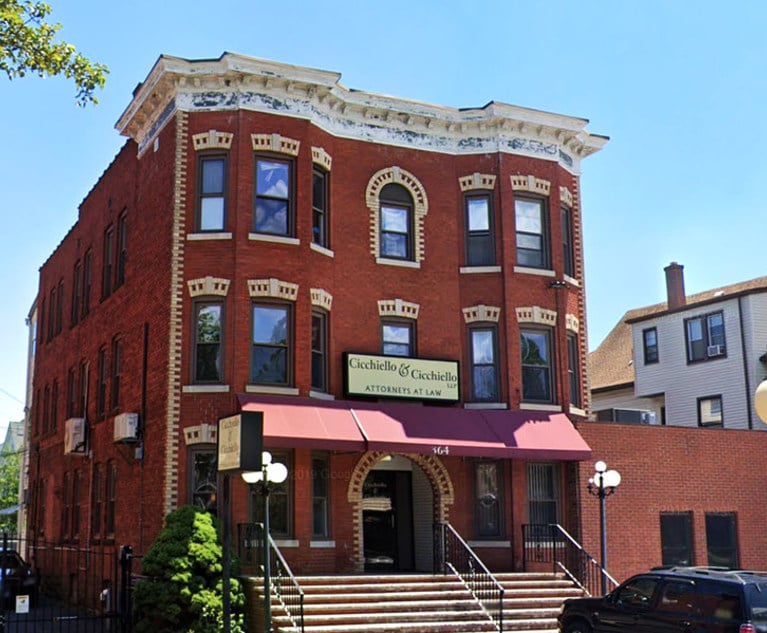 Quinnipiac School of Law Center, North Haven
Quinnipiac School of Law Center, North HavenQuinnipiac School of Law Center To Host Opioid Crisis Summit
The Quinnipiac University School of Law Center in North Haven is teaming up with community members to address the state's opioid crisis.An invitation-only…
October 25, 2018 at 03:30 PM
2 minute read
The Quinnipiac University School of Law Center in North Haven is teaming up with community members to address the state's opioid crisis.
An invitation-only forum featuring professionals and others affected by the deadly crisis will be livestreamed Nov. 9 and is expected to generate policy recommendations, said Dean Jennifer Gerarda Brown, and “identify programs to help and support those afflicted by opioid addiction, including their families, towns, schools, communities and treaters, to destigmatize the disease, and to offer hope to those who have been affected by opioid addiction.”
Brown said the day-long summit will identify programs that are working and help develop additional recommendations. State and local government officials and professionals from various fields examine what first responders are seeing in the field, discuss available treatment options and hear first-person accounts from dependent users, family members and caregivers.
According to the National Institute on Drug Abuse, Connecticut is among the top ten states for its rate of opioid-related overdose deaths, having seen the rate increase fourfold in 2016 from 5.7 to 24.5 deaths per 100,000 people. The national average is 13.3 per 100,000. From 2012 to 2016, combined heroin, prescription and synthetic opioid deaths increased from 108 per year to 1,214.
Ten working groups at Quinnipiac will cover areas including opioid education, first responders, law enforcement, family support, medical provider education, opioids in schools, etc. The groups will spend the next seven months researching their topics, coming up with findings and creating plans to move their ideas forward. They will return to the school June 7 to present their findings.
The Connecticut Bar Foundation and the Connecticut Bar Association are co-sponsoring the summit with Quinnipiac. Information about the findings and recommendations will be made available starting June 7.
This content has been archived. It is available through our partners, LexisNexis® and Bloomberg Law.
To view this content, please continue to their sites.
Not a Lexis Subscriber?
Subscribe Now
Not a Bloomberg Law Subscriber?
Subscribe Now
NOT FOR REPRINT
© 2024 ALM Global, LLC, All Rights Reserved. Request academic re-use from www.copyright.com. All other uses, submit a request to [email protected]. For more information visit Asset & Logo Licensing.
You Might Like
View All
Managing Partner Vindicated in Disciplinary Proceeding Brought by Former Associate
5 minute read
Connecticut Movers: Year-End Promotions, Hires and an Office Opening
5 minute read
GC Pleads Guilty to Embezzling $7.4 Million From 3 Banks

Trending Stories
Who Got The Work
Michael G. Bongiorno, Andrew Scott Dulberg and Elizabeth E. Driscoll from Wilmer Cutler Pickering Hale and Dorr have stepped in to represent Symbotic Inc., an A.I.-enabled technology platform that focuses on increasing supply chain efficiency, and other defendants in a pending shareholder derivative lawsuit. The case, filed Oct. 2 in Massachusetts District Court by the Brown Law Firm on behalf of Stephen Austen, accuses certain officers and directors of misleading investors in regard to Symbotic's potential for margin growth by failing to disclose that the company was not equipped to timely deploy its systems or manage expenses through project delays. The case, assigned to U.S. District Judge Nathaniel M. Gorton, is 1:24-cv-12522, Austen v. Cohen et al.
Who Got The Work
Edmund Polubinski and Marie Killmond of Davis Polk & Wardwell have entered appearances for data platform software development company MongoDB and other defendants in a pending shareholder derivative lawsuit. The action, filed Oct. 7 in New York Southern District Court by the Brown Law Firm, accuses the company's directors and/or officers of falsely expressing confidence in the company’s restructuring of its sales incentive plan and downplaying the severity of decreases in its upfront commitments. The case is 1:24-cv-07594, Roy v. Ittycheria et al.
Who Got The Work
Amy O. Bruchs and Kurt F. Ellison of Michael Best & Friedrich have entered appearances for Epic Systems Corp. in a pending employment discrimination lawsuit. The suit was filed Sept. 7 in Wisconsin Western District Court by Levine Eisberner LLC and Siri & Glimstad on behalf of a project manager who claims that he was wrongfully terminated after applying for a religious exemption to the defendant's COVID-19 vaccine mandate. The case, assigned to U.S. Magistrate Judge Anita Marie Boor, is 3:24-cv-00630, Secker, Nathan v. Epic Systems Corporation.
Who Got The Work
David X. Sullivan, Thomas J. Finn and Gregory A. Hall from McCarter & English have entered appearances for Sunrun Installation Services in a pending civil rights lawsuit. The complaint was filed Sept. 4 in Connecticut District Court by attorney Robert M. Berke on behalf of former employee George Edward Steins, who was arrested and charged with employing an unregistered home improvement salesperson. The complaint alleges that had Sunrun informed the Connecticut Department of Consumer Protection that the plaintiff's employment had ended in 2017 and that he no longer held Sunrun's home improvement contractor license, he would not have been hit with charges, which were dismissed in May 2024. The case, assigned to U.S. District Judge Jeffrey A. Meyer, is 3:24-cv-01423, Steins v. Sunrun, Inc. et al.
Who Got The Work
Greenberg Traurig shareholder Joshua L. Raskin has entered an appearance for boohoo.com UK Ltd. in a pending patent infringement lawsuit. The suit, filed Sept. 3 in Texas Eastern District Court by Rozier Hardt McDonough on behalf of Alto Dynamics, asserts five patents related to an online shopping platform. The case, assigned to U.S. District Judge Rodney Gilstrap, is 2:24-cv-00719, Alto Dynamics, LLC v. boohoo.com UK Limited.
Featured Firms
Law Offices of Gary Martin Hays & Associates, P.C.
(470) 294-1674
Law Offices of Mark E. Salomone
(857) 444-6468
Smith & Hassler
(713) 739-1250










